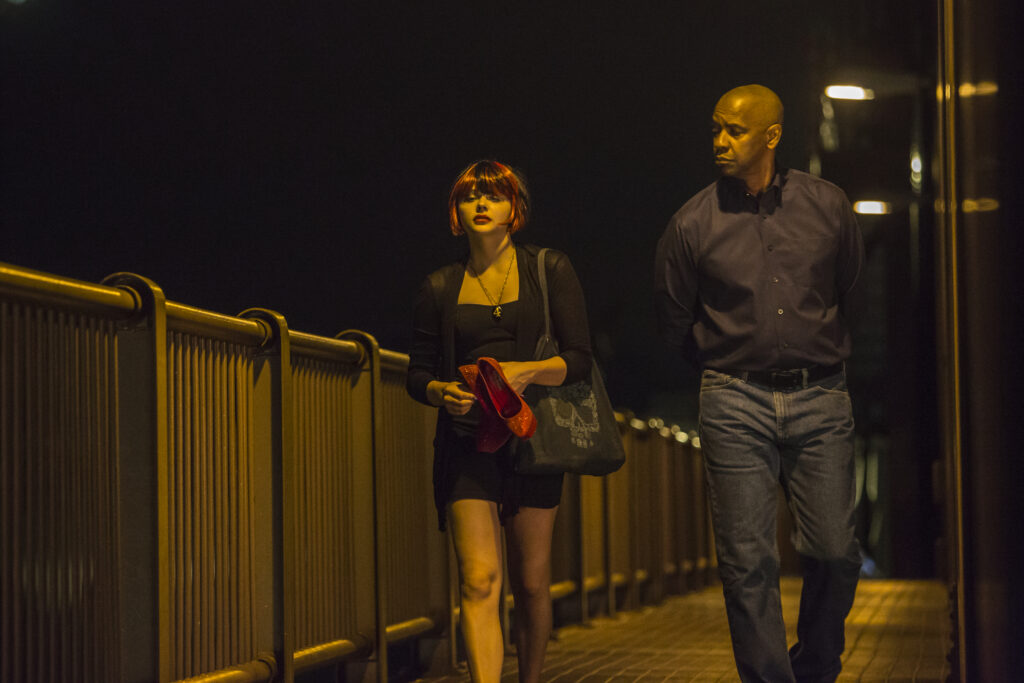The last time director Antoine Fuqua and actor Denzel Washington teamed up, back in 2001, Washington ended up scoring a Best Actor Oscar trophy for delivering some of his best work as a manipulative and smooth-talking crooked cop in the urban thriller Training Day. Though Washington has continued to turn in solid-to-great performances since then, Fuqua has not been nearly as lucky professionally, becoming lost in the shuffle after that sturdy sophomore effort, starving for a hit or anything resembling a solid piece of entertainment. After duds like King Arthur, Shooter and Olympus Has Fallen, he unfortunately continues his losing streak with his latest film, The Equalizer, an unabashed and brainless banquet of vigilante brutality. The film, adapted from the popular 1980s TV series of the same name, is nothing more than crowd-pleasing schlock obsessed with grisly death scenes one might stumble upon in any of the Saw films. Here, Washington plays Robert McCall, a loner living in Boston who strolls around his job at a Home Depot-esque hardware store with a mystical air about him. Every night, he frequents the same neighborhood diner where he reads classic books and makes small talk with teenage prostitute Teri (Chloë Grace Moretz), who is eventually roughed up by the sleazy Russian mobsters who pimp her out. This doesn’t please McCall, who waltzes into the mobsters’ nightclub and offers $9,800 in exchange for her freedom. Negotiations predictably go south as McCall takes out the entire room, earning the attention of a Russian mob boss (Marton Csokas) whose defining character traits are his short fuse and his surfeit of tattoos.
Fuqua’s heavy-handed direction kills any sense of momentum or urgency; it somehow plays as more depressing than invigorating.
While Washington has always exuded charisma even when playing unsavory characters, he comes off as bored and stilted in this film — maybe not a surprise, though, considering the lifeless character he’s playing. McCall is little more than a humorless Samaritan who calls upon his past skill set as a former black-ops commando in order to dispose of the cardboard gangsters and shine a light on the city’s police corruption. Functioning as a less thoughtful and heartless version of the late Tony Scott’s Man on Fire, The Equalizer fails to muster up any of the dramatic heft of Scott’s film, exuding no sense of peril whatsoever as McCall’s bloody quest for vengeance trods its well-worn, derivative path. He’s essentially Batman sans the signature mercy or restraint. Fuqua’s film also succumbs to poor editing and pacing. Two hours and 10 minutes is more than justifiable if proper attention is paid to character and environment, but The Equalizer’s focus on lame subplots (one especially awful one involves McCall helping an overweight co-worker get in proper physical shape for a promotion) and Fuqua’s faux-badass direction of it all only heightens the disappointment. We’ve seen Washington walk away from exploding objects in slow-motion before, but Fuqua’s heavy-handed direction kills any sense of momentum or urgency; it somehow plays as more depressing than invigorating. Throw in an eye-rolling introductory Mark Twain quote, underwritten female characters, a Home Alone-like climax, and an underwhelming “three weeks later” sequence that hilariously places McCall in Moscow for one last bid of justice, and you’ve got a bunch of pointless spare parts that add up to a dispiritingly empty whole.

